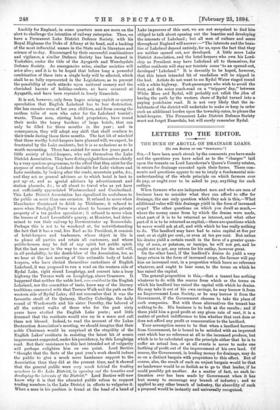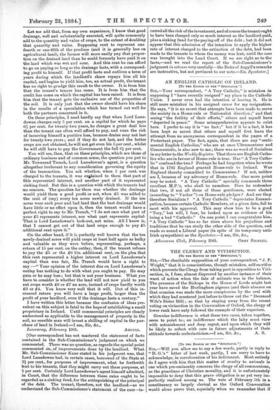LETTERS TO THE EDITOR.
THE DUKE OF ARGYLL ON DRAINAGE LOANS. [To THE EDITOR OF THE "SPECTATOR."] SIR,-I have been much struck by the comments you have made
and the questions you have asked as to the " charges " laid upon the tenants on Lord Lansdowne's Queen's County estates, in return for drainage executed upon their farms. These com- ments and questions appear to me to imply a fundamental mis- understanding of the whole principle on which farmers ever do pay, or ought ever to be asked to pay, anything for such outlays.
When farmers who are independent men and who are men of business have to consider what they can afford to offer for drainage, the one only question which they ask is this,—What additional value will this drainage yield in the form of increased crops? The other questions on which you dwell so much,— where the money came from by which the drains were made, what part of it is to be returned as interest, and what other part of it is to be returned as capital,—these are questions which
he never would ask at all, and with which he has really nothing to do. The landlord may have had to raise capital at five per• cent. or at eight per cent., or even at ten per cent. But unless his drains yield, a certain result in the form of a greater quan- tity of corn, or potatoes, or turnips, he will not get, and he ought not to get, any return for his outlay, however great.
On the other hand, if the landlord's drains do yield a very large return in the form of increased crops, the farmer will pay him an increased rent, in a proportion which bears no reference whatever, and ought to bear none, to the terms on which he has raised the capital.
The general proposition is this,—that a tenant has nothing whatever to do with the source from which or the terms on which his landlord has raised the capital with which he drains. He may take it out of his own savings, he may borrow it from an Improvement Loan Society, or he may borrow it from the Government, if the Government chooses to take the place of such companies. But with these alternatives the tenant has nothing to do. His business is to look at the results ; and if these yield him a good profit at any given rate of rent, it is a matter of perfect indifference to him whether that rent does or does not afford any profit or remuneration to the landlord.
Your assumption seems to be that when a landlord borrows from Government, he is bound to be satisfied with an improved rent which has no reference at all to the increased produce, but which is to be calculated upon the principle either that •he is to suffer an actual loss, or at all events is never to make one farthing of profit out of the improvement of his own land. Of course, the Government, in lending money for drainage, may do so on a distinct bargain with proprietors to this effect. But of course, also, the result of such an unjust bargain would be that no landowner would be so foolish as to go to that lender, if he could possibly get another. As a matter of fact, no such in- timation ever has been made by Government when it has lent money to encourage any branch of industry ; and as applied to any other branch of industry, the absurdity of such a proposal would be instantly and universally recognised. Let me add that, from my own experience, I know that good .drainage, well and substantially executed, will quite commonly add to the quantity and value of crops, to the extent of doubling that quantity and value. Supposing rent to represent one fourth or one-fifth of the produce (and it is generally less on agricultural land), the farmer will more easily pay that propor- tion on the drained land than he could formerly have paid it on the land which was wet and sour. And this rent he can afford to go on paying so long as the drainage lasts, with a correspond- itig profit to himself. If that profit lasts and outlives a term of years during which the landlord's share repays him all his 'capital, and begins to yield him, too, an actual profit, the tenant 'has no right to grudge this result to the owner. It is from him that the tenant's tenure has come. It is from him that the credit has come on which the capital has been raised. It is from him that the tenant gets the exclusive use of the properties of the soil. It is only just that the owner should have his share in the results of a speculation which has turned out well for both the partners concerned in it.
On these principles, I need hardly say that when Lord Lans- downe charges only 5 per cent. on a capital for which he pays
4 per cent. for twenty-two years, he charges a great deal less than the tenant can often well afford to pay, and runs the risk of incurring himself a positive loss, because drains may not last for twenty-two years ; and if they do not last, and the better crops are not obtained, he will not get even his 5 per cent., whilst he will still have to pay the Government the full 61 per cent.
You will see, then, that on these principles, which are those of 'ordinary business and of common sense, the question you put to Mr. Townsend Trench, Lord Lansdowne's agent, is a question altogether irrelevant to any consideration governing the equity of the transaction. You ask whether, when 5 per cent. was -charged to the tenants, it was exglained to them that part of this represented interest, and another part of it represented sinking-fund. But this is a question with which the tenants had so concern. The question for them was whether the drainage would yield them a good profit or not, when £5 was added to the rent of (say) every ten acres newly drained. If the ten acres were such poor and bad land that the best drainage would have little or no effect upon it, then the tenant would have a perfect right to say to Mr. Trench, "I do not care what part of your E5 represents interest, nor what part represents capital. 'That is Lord Lansdowne's look-out, not mine. All I know is, that I cannot get out of that land crops enough to pay 25 additional rent upon it."
On the other hand, if it is perfectly well known that the ten sewly-drained acres will yield crops at least half again as bulky and valuable as they were before, representing, perhaps, a return of 15 per cent. on the outlay, then, if the tenant refuses to pay the 25 or the 26 108. additional rent, on the plea that this rent represented a higher interest on Lord Lansdowne's -capital than was fair, Mr. Trench would have a right to any :—" Your opinion of the interest due on Lord Lansdowne's -outlay has nothing to do with what you ought to pay. He may gain or he may lose ; but that is not your business. What you have to consider is whether the land will not now yield to you eat crops worth £6 or £7 an acre, instead of crops hardly worth £3 or £4. You know very well that it will. Out of this in- creased return you will have a large profit, larger than the profit of your landlord, even if the drainage lasts a century."
I have written this letter because the confusion of ideas pre- valent on this subject is fatal to the hope of establishing a small proprietary in Ireland. Until commercial principles are clearly understood as applicable to the management of property in the soil, no sensible man will invest a shilling of capital in the pur- chase of land in Ireland.—I am, Sir, Izc.,
Inveraray, February 19th. ARGYLL.
[Our correspondent has not mastered the statement of facts contained in the Sub-Commissioner's judgment on which we commented. There was no question, as regards the special point commented On, of improvements done by the landlord. What Mr. Sub-Commissioner Bane stated in his judgment was, that Lord Lansdowne had, in certain cases, borrowed of the State at 3i per cent., for purposes of improvement, what he forthwith lent to his tenants, that they might carry out these purposes, at
5 per cent. Certainly Lord Lansdowne's agent himself admitted, in Court, that the difference between these rates ought to be regarded as a sinking fund, for the extinguishing of the principal of the debt. The tenant, therefore, not the landlord—as we understand the Sub-Commissioner's statement of the case—in-
curred all the risk of the investment, and of course the tenant ought to have been charged only so much interest as the landlord paid, plus a sinking fund for the paying off of the debt ; but it did not appear that this admission of the intention to apply the higher rate of interest charged to the extinction of the debt, had been made to the tenants to whom the money was lent, until the case was brought into the Land Court. If we are right as to the facts,—and we read the report of the Sub-Commissioner's judgment in eztenso very carefully—the Duke of Argyll's remarks are instructive, but not pertinent to our note.—En. Spectator.]



































 Previous page
Previous page